April 10, 2004
Crasqui, Parqe Nacional Archipielago de Los Roques, Venezuela N 11.5368 W066.4428
Back on the "rode" again
Any crew that has been at dock as long as we have, undertakes departure with trepidation. You need to refamiliarize yourself with the boat systems, tune into the weather stations, buy food like it may be your last opportunity before entering the nursing home, reset the safety equipment and ground tackle, top off the tanks, pull up the electronic charts, make sure each light bulb and fuse has a replacement onboard and finally clear customs and immigration. Not that we're leaving Venezuela right away but rather that there is no place to clear after we leave Puerto La Cruz.
There are a number of boats leaving about this time and most are headed west and some eventually back to the US. 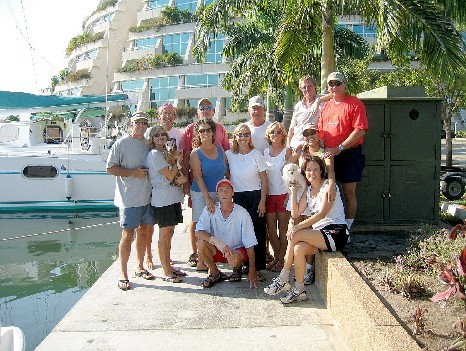 The local discount food stores, marine chandleries, dentists, plastic surgeons, etc. are all making a great deal of money as final preparations are made and items or procedures long procrastinated over have no time left to escape our attention. Heading west will take us through the Venezuelan offshore islands where there is little but a coast guard station, clear water and coral reefs. Beyond the Venezuelan islands lie the ABC's (Aruba, Bonaire and Curacao) part of the Netherlands Antilles. The ABC's can be very expensive, so we load up on provisions in Venezuela until the new water line on the boat is as low in the water as the old one. I wonder how the boat will sail with all this weight onboard. The local discount food stores, marine chandleries, dentists, plastic surgeons, etc. are all making a great deal of money as final preparations are made and items or procedures long procrastinated over have no time left to escape our attention. Heading west will take us through the Venezuelan offshore islands where there is little but a coast guard station, clear water and coral reefs. Beyond the Venezuelan islands lie the ABC's (Aruba, Bonaire and Curacao) part of the Netherlands Antilles. The ABC's can be very expensive, so we load up on provisions in Venezuela until the new water line on the boat is as low in the water as the old one. I wonder how the boat will sail with all this weight onboard.
Political unrest continues in Venezuela as the decision on the referendum is at a stalemate. The streets in Caracas are filled with teargas and smoke from tires set afire to block traffic. In a very minor way Puerto La Cruz has some of these activities but a good taxi driver will find his way around the roadblocks or drive through the fire line at a high rate of speed.
President Chavez is claiming the US is interfering in the internal affairs of Venezuela by financing the opposition and has even called President Bush some very unpleasant names. He rants and raves on TV and radio almost every day and no one seems to pay attention to this diversionary tactic of blaming the U.S. for all his troubles. He has surrounded himself with Cuban bodyguards and he is more than a little paranoid and who wouldn't be with 500,000 people in the streets and Venezuela's history of coups and attempted coups. Even Chavez went to prison in a coup attempt in 1992 and he himself was ousted from office in 2000, albeit for a few hours only.
Venezuela is the third or fourth largest exporter of oil to the US and PDVSA, the Venezuelan oil company, owns Citgo a nice profit center for PDVSA . One day Chavez is going to sell off Citgo and cut off all oil to the US and the next he is signing a long term agreement with Texaco who is investing $400 million to develop oil and natural gas reserves. The unofficial exchange rate continues to favor the dollar reflecting political and financial uncertainty. At the same time the reserves of the Bank of Venezuela continue to grow due to oil exports and the frozen exchange rate. Newly issued bonds mix the payout in B's and $USD and have been quickly snapped up in the financial markets.
Despite all this our departure is based upon the seasonal winds not the political winds. A flotilla of our friends are departing around the same time and we plan to meet them along the way and occasionally sail together from anchorage to anchorage. There is safety in numbers in these remote locations although "boardings" are few and far between.
For now Rene is practicing....... "cast off the port line..............cast off the starboard."
Several days later.......................
We departed Puerto La Cruz and raised the sails for a small island off the coast, Cegumina Segunda. After anchoring, we tested the watermaker since the condition of the water in PLC will not allow a dock test. 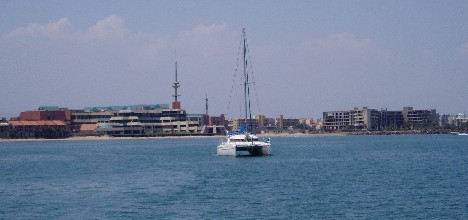 After nine months of being pickled (the watermaker that is) it sprung leaks and it was back to PLC for repair parts. The end cap had a hairline crack and wouldn't hold 800psi. We later found out that this design flaw has caused problems for HRO owners for a long time. We ordered parts from the US and as a back up had one made of stainless steel instead of plastic. After nine months of being pickled (the watermaker that is) it sprung leaks and it was back to PLC for repair parts. The end cap had a hairline crack and wouldn't hold 800psi. We later found out that this design flaw has caused problems for HRO owners for a long time. We ordered parts from the US and as a back up had one made of stainless steel instead of plastic.
Camperdown, the boat we left with, also had to return due to an electrical problem with its generator.
One week later.................................
After exceptional assistance from many people we are back under sail. Particular thanks goes to Captain Mary Stone of Miss Astor for all the help with phones, local knowledge, good ideas and just plain encouragement. Our friends Dick and Sue Hutchison onboard Sojourner waited on the outer islands a week for Shiraz and Camperdown and now finally we are all underway.......but still no watermaker.
We sailed to Isla Blanquilla after departing from Puerto La Cruz. This little island is named after a wealthy North American Blankenship who built a house and an airstrip and created his own little hideaway which is now a ruin along the northern shore . We were visited by the National Guard to check us in and the next day we went and begged 15 gallons of water from the First Lieutenant in charge of this six man outpost. 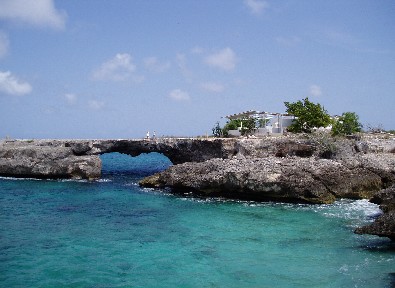 He was very accommodating and invited us to stay as long as we wished. We were also visited by the local fishing boats and for a small bottle of rum ($1.00) and a package of Fig Newtons we had a tuna that was large enough to feed us and the crews sailing with us and then some in the freezer. Right before we left the island to sail to Los Roques, Sojourner traded three beers for two lobsters, not bad. It all depends on the catch of the day and how thirsty the fishermen are. He was very accommodating and invited us to stay as long as we wished. We were also visited by the local fishing boats and for a small bottle of rum ($1.00) and a package of Fig Newtons we had a tuna that was large enough to feed us and the crews sailing with us and then some in the freezer. Right before we left the island to sail to Los Roques, Sojourner traded three beers for two lobsters, not bad. It all depends on the catch of the day and how thirsty the fishermen are.
Several days later the three boats left on an overnight sail to Los Roques. When Shiraz sails we find the best point of sail for the general direction we are headed and on this night we ended up 6 or 7 miles off the rhumb line (an imaginary line showing the shortest distance over water between two points). Then it's a jibe back to the rhumb line and there you are right where you want to be. Other boats stay on the rhumb line but often the winds do not allow for great sailing at that particular angle. We also set our auto pilot to utilize the wind vane feature which allows the boat to turn in order to keep the sails at the best angle. Occasionally the wind will shifts too far and the auto pilot will alert us. We then need to be patient because it usually resets itself or perform a manual reset possibly at a new point of sail. The following winds and current gave us excellent sailing conditions and most of the night we were sailing at around 8 knots. Anyway we ended up at Los Roques which is a large protected reef with small studded islands everywhere. This area is purported to have the best bone fishing in the world. The shifting sands and coral heads create navigation that is strictly visual, so forget the charts and stand as high as you can on the deck and guide your boat by the color of the water. Since we didn't spend much time in the Bahamas, we have not practiced this technique very much. It takes some coordination and trust between the person sighting and the person at the helm.
We spent most of our nights anchored behind a reef which gives you the impression that you are anchored in the middle of the ocean since there is nothing above sea level to obstruct your view. Typically we are less than a half a mile off the leeward side of an island looking at beach and more often than not the run down area of town.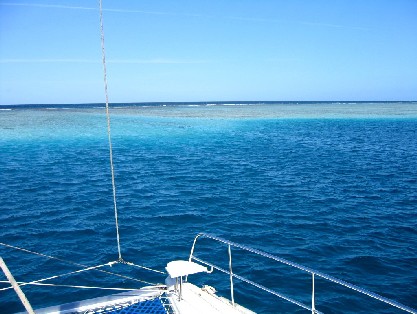 From these locations we were able to snorkel the surrounding coral heads, play bocce ball on the beach, and get together will our friends on Sojourner and Camperdown to enjoy sundowners and appetizers and a few birthday dinners. From these locations we were able to snorkel the surrounding coral heads, play bocce ball on the beach, and get together will our friends on Sojourner and Camperdown to enjoy sundowners and appetizers and a few birthday dinners.
Many of the best anchorages in Venezuela are now national parks and within the last several weeks the Coast Guard is starting to enforce a 1992 law requiring a cruising permit. The cost is approximately $2.00 per foot and $25.00 per person. In the US a cruising permit for foreign flagged vessels is $30.00 per year the last I heard. Since we are already checked out internationally we can't buy a two week permit not that we would at these prices. Anyway we can spend two days in the area as a vessel in transit unless we have problems. Everyone we talk to seems to have "mechanical problems" in Los Roques in order to extend their stay. You don't rush out to contact the Coast Guard but if they find you the story is that you just arrived last night and plan to check in tomorrow. But for now we have been lucky and are taking our time enjoying the array of colorful fish and crystal clear water. We often wish we had an underwater camera in order to show the great variety of coral fish. There are Blue Tangs that are the color of blue opals and then there are blue tangs that are bright yellow the color of sunflowers (a matter of maturity), all variety and colors of Parrotfish, Angelfish, Butterflyfish, Blueheaded Wrasse, Stingrays, Yellowtail Snapper, Trunkfish and the occasional Barracuda. Barracuda have a solitary nature and are typically very curious. When snorkeling they will follow you for a great distance and will sometimes come within a foot or so of your fins. A sudden threatening move will not startle them and since we are in a national park you cannot carry a spear. So you get use to a three foot predator with teeth bared following you or you get out of the water, which is Rene's choice.
Last night we anchored at Crasqui in Los Roques. This long and narro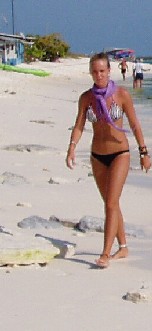 w reef is surrounded by a narrow beach of sugar white sand. Anchored around us are about thirty luxury motor yachts in the fifty and sixty foot range. Several have a 25 foot power boat in tow and at night the area not far from us lit up like an offshore city. The beach is dotted with shade tents and beach chairs and every sun bather is adorned with makeup, jewelry and scarves. It is quite the fashion show. Para-surfers skim along the water being powered by their colorful foils and overpowered dinghies tow skiers behind them. Quite a contrast from the isolation of the previous nights. But it's good to get out and stretch our legs. There is one restaurant where they serve only lobster but you have to make reservations in advance. We may try it later. w reef is surrounded by a narrow beach of sugar white sand. Anchored around us are about thirty luxury motor yachts in the fifty and sixty foot range. Several have a 25 foot power boat in tow and at night the area not far from us lit up like an offshore city. The beach is dotted with shade tents and beach chairs and every sun bather is adorned with makeup, jewelry and scarves. It is quite the fashion show. Para-surfers skim along the water being powered by their colorful foils and overpowered dinghies tow skiers behind them. Quite a contrast from the isolation of the previous nights. But it's good to get out and stretch our legs. There is one restaurant where they serve only lobster but you have to make reservations in advance. We may try it later.
But for now we are watching the sunset looking for the green flash and on occasion watch a CDV movie purchased in Puerto La Cruz for a little over a dollar. The newest titles are available but the quality leaves something to be desired. We set up the laptop in the stateroom for a late night of movie watching and then turn in around nine thirty.
When you spend nine months someplace your anchor starts to grow roots. It was difficult to leave behind direct TV, air conditioning, all the potable water you want, French fries, pizza, ice cream and most all of the Venezuelan friends we made. As for the cruisers we met, many are also underway now while others are still doing boat jobs. We plan to see most of them again.
As Andres Hausmann the owner of Isla Paraiso puts it," ...even with Chavez, Venezuela is the second best country to live in..." But for us it's back on the "rode" again.
P.S. The "rode" in nautical terms is the chain or line that attaches the anchor to the vessel.
20 April 2004
Aves de Sodavento, Venezuela N22.5875 W067.3954
Lobster hunt
On Easter evening the Gaurdacosta, Park Rangers, local Customs and Immigration and the Guardia Nacional stopped by our boat to tell us it was time to go since our exit papers were more than a month old. There was an interpreter onboard their launch speaking halting English and we could make out something like "don't let the sun set on you one more night in Venezuela".
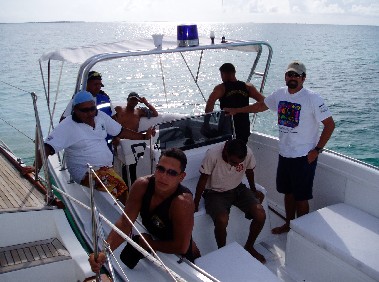 It is a difficult position for the Guardacosta since the President of Venezuela has been telling the people of Venezuela that the US has been interfering with Venezuelan internal affairs and that President Bush is after Venezuelan oil. Now here we are in an offshore island violating immigration laws. It is a difficult position for the Guardacosta since the President of Venezuela has been telling the people of Venezuela that the US has been interfering with Venezuelan internal affairs and that President Bush is after Venezuelan oil. Now here we are in an offshore island violating immigration laws.
Finally the officials in the 25 foot runabout told us that we could go to Grand Roques the next morning to fill up with fuel before we departed but that we must leave the next day, not one more night after tonight.
At first light we made our way to Grand Roques and checked with all the fuel boats but they were empty due to the heavy holiday traffic. The AUA which is the utility company on the island will occassionally sell fuel from its water desalination plant but they were already below the reserve level. We finally made our way to the dive shop on the square. It became our center for information since there were several English speaking employees and our gratitude goes to Alex of the dive shop for all the assistance he provided us. We must have gone back three times to seek advice and on the third trip Alex radioed the Guardacosta and after a bit of explaining we were summoned before the commandant and given a 48 hour extension and a stern warning to be gone before the pass expired. We needed to do a formal check-in and the procedure included a stop at all four authorities on this little island so we walked from end to end seeking the right stamps and signatures.
We were encouraged by a previous conversation we had with the fuel barge, the Normandia, that it would return to the Roques on Tuesday and we would have sufficient time to refuel before we had to leave. Shiraz needed water more than fuel and that was available without charge at the desalination "plant". We put water cans in our dinghy and made four trips to fill our water tank. It took the whole afternoon. Did you know that a six gallon water can weighs 50 pounds or more and by the end of the afternoon can surpass 100 pounds. Our traveling companions were more in need of fuel and since we were looking at $.12 per gallon in Los Roques verses $3.00 in Bonaire, we couldn't pass up a bargain.
Grand Roques has several nice posadas or small hotels and some good restaurants. The streets are sand and void of tourists during the day because they have all been trans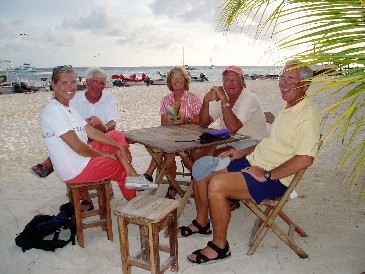 ported by launch to one of the dozens so small islands and sandy beaches in the area with an umbrella and a cooler. There they spend the day on their own little island or sand bar isolated form everyone. The grocery store on the island is restocked every week with fresh vegetables and since we are out of tomatoes, lettuce, etc., we took the opportunity to load up. At the same time we were trying to spend our Venezuelan B's down to the last penny since they are not recognized by any bank outside of Venezuela. That night we headed in for a wonderful dinner and a few drinks at a small restaurant on the beach. ported by launch to one of the dozens so small islands and sandy beaches in the area with an umbrella and a cooler. There they spend the day on their own little island or sand bar isolated form everyone. The grocery store on the island is restocked every week with fresh vegetables and since we are out of tomatoes, lettuce, etc., we took the opportunity to load up. At the same time we were trying to spend our Venezuelan B's down to the last penny since they are not recognized by any bank outside of Venezuela. That night we headed in for a wonderful dinner and a few drinks at a small restaurant on the beach.
The Normandia showed up at about nine the next morning and it took us most of the day to fill the boat. It is a backbreaking job and at the end of the day you and your dinghy are doused with diesel. You take the dinghy over to the barge and tie up along side and lift the empty cans high above your head to put them on the deck of the barge. In between filling large trawlers that take on 300, 400 or 500 gallons they fill your little 6 gallon cans with the high pressure hose. Diesel spills all over the cans and when they hand them down to you they were as slippery as a greased watermelon. The wind picked up and now the dinghy is bouncing up and down about two feet as you take the cans from overhead. Of course the cap is now broken on one and another can has the air vent open. But you pay and your off heading up wind, bouncing all over with fuel spilling out of the cans into the bottom of your dinghy making it impossible to stand up because the floor is so slick. Making it back to Shiraz, I lift the cans onto the deck trying not to get diesel everywhere. The first trip goes into the tank. And I am tired and decide to forego the 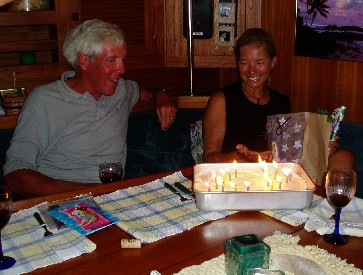 second trip but Rene' encourages me and well it is her birthday and what better birthday present than a $70.00 savings on diesel, she is so practical. But hey we cleaned up and that night celebrated Rene's birthday with our friends Cindy and Alan and Dick and Susan aboard Sojourner. Since our children are not expecting any inheritance they forgot it was Rene' s birthday or do I have this backwards? second trip but Rene' encourages me and well it is her birthday and what better birthday present than a $70.00 savings on diesel, she is so practical. But hey we cleaned up and that night celebrated Rene's birthday with our friends Cindy and Alan and Dick and Susan aboard Sojourner. Since our children are not expecting any inheritance they forgot it was Rene' s birthday or do I have this backwards?
The next morning we set sail for Aves de Barlavento a group of small uninhabited islands west of Los Roques and yet still in Venezuelan waters. This down wind sail started with some good size swells on the rear quarter especially after a night of partying. But things settled down and we were anchored by four in the afternoon having sailed all the way. We take great pride in sailing where we go and every time we go out we try and leave early enough to sail the distance. Many or most cruisers don't think of their engines as auxiliary but rather as the primary source of power. We, on the other hand, are new to all this and enjoy the challenge of sailing. Either that or we are too cheap to buy the fuel.
Barlavento is home of a giant rookery for birds and we were just in time to see the chicks of the red footed booby in their low lying nest. Booby's were so named by sailors to ridicule the intelligence of a bird that would land on a boat and allow itself to be captured. Although none landed on our boat they did follow our dinghy around as if we were going to feed them at any minute. After a few days of snorkeling we moved to Aves de Sotavento and anchored near the mangrove trees. The rainy season is getting underway and we are getting 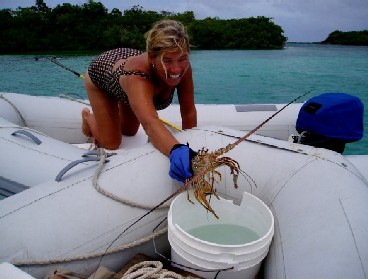 a few welcomed showers and it has been cloudy about every other day. Cloudy days take the enjoyment out of snorkeling but occasionally I try anyway. The boat was anchored in twenty feet of water and as I snorkeled toward the mangrove trees about a half mile away. The sandy bottom rose up and the grasses were now visible even on this cloudy day. An occasional piece of coral or rock cluttered the bottom in the three to four foot water I was now in and then I spotted spiny lobster hiding under every rock that could be found. The rocks were few and far between but it was easy to see the antennae sticking out from under a ledge of the rock or coral. I would grab an antenna of the hiding crustacean and they would dart into their lair leaving me with the antenna but no lobster. The little bastards were sacrificing body parts to avoid ending up in our pot. When the word of lobster reached the other boats in the anchorage (our friends and traveling companions) everyone was immediately in the water with spear guns, fishing nets and gloves trying to capture anything that moved. Lobster seem to be social arthropods and where you would find one you would usually find a half dozen. The key to catching lobster is to use a tickle stick and a net. Hold the net behind the lobster hidden under a ledge and reach in front of it with the tickle stick and after a small amount of encouragement it will dart backwards into the net. This technique is easily learned after missing only a dozen or so and spending the better part of the day in the water. The poor lobster finally gave up and sacrificed a few of their clan to us and that night we had a delicious grilled lobster appetizers followed by a great pasta dinner served on Shiraz. a few welcomed showers and it has been cloudy about every other day. Cloudy days take the enjoyment out of snorkeling but occasionally I try anyway. The boat was anchored in twenty feet of water and as I snorkeled toward the mangrove trees about a half mile away. The sandy bottom rose up and the grasses were now visible even on this cloudy day. An occasional piece of coral or rock cluttered the bottom in the three to four foot water I was now in and then I spotted spiny lobster hiding under every rock that could be found. The rocks were few and far between but it was easy to see the antennae sticking out from under a ledge of the rock or coral. I would grab an antenna of the hiding crustacean and they would dart into their lair leaving me with the antenna but no lobster. The little bastards were sacrificing body parts to avoid ending up in our pot. When the word of lobster reached the other boats in the anchorage (our friends and traveling companions) everyone was immediately in the water with spear guns, fishing nets and gloves trying to capture anything that moved. Lobster seem to be social arthropods and where you would find one you would usually find a half dozen. The key to catching lobster is to use a tickle stick and a net. Hold the net behind the lobster hidden under a ledge and reach in front of it with the tickle stick and after a small amount of encouragement it will dart backwards into the net. This technique is easily learned after missing only a dozen or so and spending the better part of the day in the water. The poor lobster finally gave up and sacrificed a few of their clan to us and that night we had a delicious grilled lobster appetizers followed by a great pasta dinner served on Shiraz.
Many of the boats proceeding us in this western trek told us of the lobsters they purchased from the local fisherman and so now we take g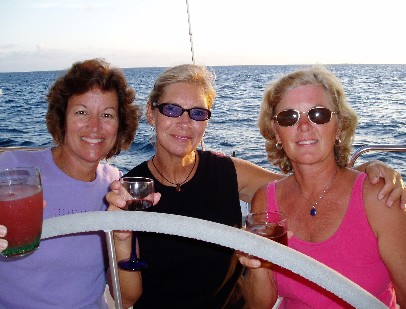 reat pleasure in thumbing our noses at them and letting them know we can provide for ourselves. reat pleasure in thumbing our noses at them and letting them know we can provide for ourselves.
Shiraz is headed to Bonaire a few days ahead of our group because we are tried of conserving water like normal cruisers. We have been spoiled by having a dependable watermaker and our boat is configured to be fresh water dependent. Our heads use fresh water, the salt water sink pump has the seacock closed so we bucket sea water aboard for dishes and the head. The washer and dryer we added has not been used and we are taking very conservative showers. Now many other cruisers travel without a water maker and we know it can be done since we have been out for over a month now but it does take a bit of something out of the pleasure. Also our three computers onboard have decided to stop operating all at the same time. Our Gateway laptop does come on intermittently but that doesn't get us e-mail and several other navigational conveniences we have on our boat computer. There is no explanation for this phenomena and this is not the first time it has happened.
So on to Bonaire in the Netherlands Antilles for a few repairs.
If you would like to see more pictures of the outer islands of Vz, just click on the arrow to start the slideshow.
Back Next
|